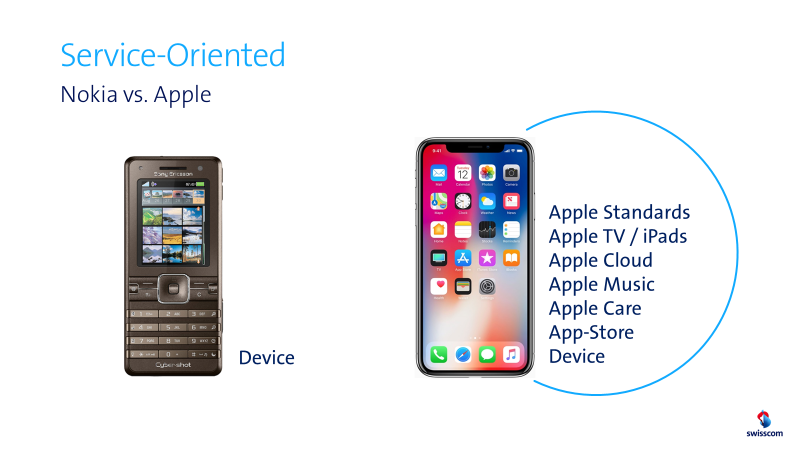Digitisation in the daily routine
From mobile connection to workhorse
When it comes to choosing a mobile network provider in the future, the key question will be: Who can offer my company the most effective support with digitisation? Comparing call and data costs is no longer enough.
Text: Michael Lieberherr, 19 march 2019
The ability to work anytime, anywhere; more flexible work models; more satisfied employees – digitisation makes all this possible. In the space of just a few years, mobile communication has become the cornerstone of corporate communication.
Mobile devices have long been used as state-of-the-art toolkits. Employees use apps to log their working hours, send invoices or receive the latest shift plans. Companies can also use mobile phones or tablets to include production workers in internal communication systems even if they do not use a PC. Many employees adapt applications that they use privately for business purposes, creating unwanted shadow IT. Apps and mobile devices are largely responsible for this trend. With 5G and the Internet of Things, applications will grow even more closely together with companies, their products and their infrastructure. But beware: mobile devices are only productive for employees if they build bridges between devices and workplace environments – and this is the only way of preventing shadow IT.
How the phone became a tool
As far as mobile applications are concerned, the iPhone heralded a new era. Services auch as the App Store, Apple Care or iCloud created a unique and unprecedented experience. The combination of perfectly matched services maximised the benefits for users. It was only then that mobile devices became tools. Apple was transformed from a device manufacturer into a solution provider. A similar transformation lies ahead for mobile network providers.
Until now, mobile operators have been largely judged in terms of their networks and differences in network capacity, territorial coverage or roaming quality. Although these factors will remain relevant in the future, spin-off services and integration capacity will also come into play. These are necessary for a company’s long-term digitisation.
Supplier or solution provider?
Which mobile provider should you choose? Not all customers are looking for the same thing. For some, the services provided by mobile providers are simply a commodity. They argue that their company should purchase everything at minimum cost. They therefore often let their employees choose their mobiles, providers and subscriptions, limiting their contribution to usage costs. This results in a potpourri of devices, providers and subscriptions. Other companies recognise the revolutionary changes that mobile networking can create for their business. They deliberately assess other factors such as integration capacity, IT capabilities and innovation. They believe end-to-end solutions are crucial in order to integrate mobile devices into company systems, manage them and use them to securely process company data. They know that the higher the level of digitisation, the easier it will be for employees and systems to process company data on the move.

Companies already have stringent requirements in terms of connection management, centralised security functions or seamless usage when devices go wrong. It is worth taking an independent, critical look at what mobile providers are offering: to what extent are their services genuinely integrated and what exactly do they contain? Of course, a system involving different providers can be cobbled together, but integration capacity usually tends to fall by the wayside.
A look into the future
With 5G, the boundary between telecommunications and IT will quickly disappear. The more a company digitises its processes, the more mobile communications will become its central nervous system. Mobile devices are already generating huge quantities of data which will be used in the future to optimise business processes even further. Technological innovations will give companies a competitive advantage over their rivals. Here also, it is worth asking whether a potential provider can offer a high level of innovation and sustainability, and whether it has a suitable strategy.
Choosing a provider therefore involves much more than simply comparing the cost of calls and data. What may seem a low-cost solution at first glance can, in some situations, turn out to be an expensive undertaking. Small wonder that customers often return to their previous provider. The selection of an end-to-end solution is crucial to how well a company lays a foundation for its own digitisation.
Different services at a glance
It is only when they are linked together that mobile devices become powerful tools. Below is a summary of services.
Security for mobile data – included as standard with Enterprise Mobile S
The new world of mobile work tools presents a challenge for IT security, since the perimeter that needs protecting is growing massively. Central management tools – also known as Enterprise Mobile Management – are therefore necessary. These can be used to delete devices remotely if they are lost, for example, or to access sensitive company data via applications separate from the normal operating system. An assortment of different devices, providers and operating system versions hinders such applications.
Complete flexibility for company and employees – included as standard with Enterprise Mobile S
Companies often face a dilemma between business and private use, as well as between employees’ wishes and company guidelines. Numerous privately owned devices such as tablets are sometimes used for work. Electronic fleet management solutions, such as Swisscom’s Mobility for Work, solve this dilemma. The company chooses a basic package and employees can manage everything themselves online via the Customer Center, adding international data packages, better devices, higher-spec subscriptions, additional SIM cards for private tablets, iWatches (Multidevice), etc. and, depending on company guidelines, paying the difference themselves via their own private bill. This significantly lightens the fleet manager’s workload and increases satisfaction among staff, who can access very attractive offers.
Devices and related logistics – included as standard with Enterprise Mobile S
Getting help fast is important when devices go wrong. So-called ‘Device as a Service’ models provide such assistance. Other options include leasing models for mobile devices or management of entire device fleets.
Mobile voice recording
In some industries, such as securities trading, conversations with customers need to be recorded for compliance reasons. It is important to analyse these services closely, in particular where and how the data is stored.
Indoor mobile coverage
Mobile devices are used inside buildings around 80% of the time. A provider’s indoor network coverage is important, including how it extends such coverage without users noticing when they switch networks.
Enterprise Mobile is the complete mobile solution for companies, providing much more than a simple mobile connection. Even the basic version includes additional services that can make a connection into a powerful tool and ensure that working with mobile devices is easier and more secure.
Goodbye to roaming: with 40GB of high-speed data and a flat rate, the whole of Europe is your office from March 2019.
More on the topic



